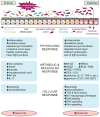Cancer-promoting effects of microbial dysbiosis
- PMID: 25123079
- PMCID: PMC4180221
- DOI: 10.1007/s11912-014-0406-0
Cancer-promoting effects of microbial dysbiosis
Abstract
Humans depend on our commensal bacteria for nutritive, immune-modulating, and metabolic contributions to maintenance of health. However, this commensal community exists in careful balance that, if disrupted, enters dysbiosis; this has been shown to contribute to the pathogenesis of colon, gastric, esophageal, pancreatic, laryngeal, breast, and gallbladder carcinomas. This development is closely tied to host inflammation, which causes and is aggravated by microbial dysbiosis and increases vulnerability to pathogens. Advances in sequencing technology have increased our ability to catalog microbial species associated with various cancer types across the body. However, defining microbial biomarkers as cancer predictors presents multiple challenges, and existing studies identifying cancer-associated bacteria have reported inconsistent outcomes. Combining metabolites and microbiome analyses can help elucidate interactions between gut microbiota, metabolism, and the host. Ultimately, understanding how gut dysbiosis impacts host response and inflammation will be critical to creating an accurate picture of the role of the microbiome in cancer.
Conflict of interest statement
Figures
References
-
- Thomas LV, Ockhuizen T. New insights into the impact of the intestinal microbiota on health and disease: a symposium report. British Journal of Nutrition. 2012;107(S1):S1–S13. - PubMed
-
- Yang Y, Wang X, Huycke T, Moore DR, Lightfoot SA, Huycke MM. Colon Macrophages Polarized by Commensal Bacteria Cause Colitis and Cancer through the Bystander Effect. Translational Oncology. 2013;6(5):596. This study demonstrates that specific human commensals can polarize macrophages to the M1 phenotype, which then serve as effectors for bacterial induced bystander effects. They propose targeting M1 macrophages as a chemopreventive strategy. - PMC - PubMed
Publication types
MeSH terms
Grants and funding
LinkOut - more resources
Full Text Sources
Other Literature Sources
Medical


